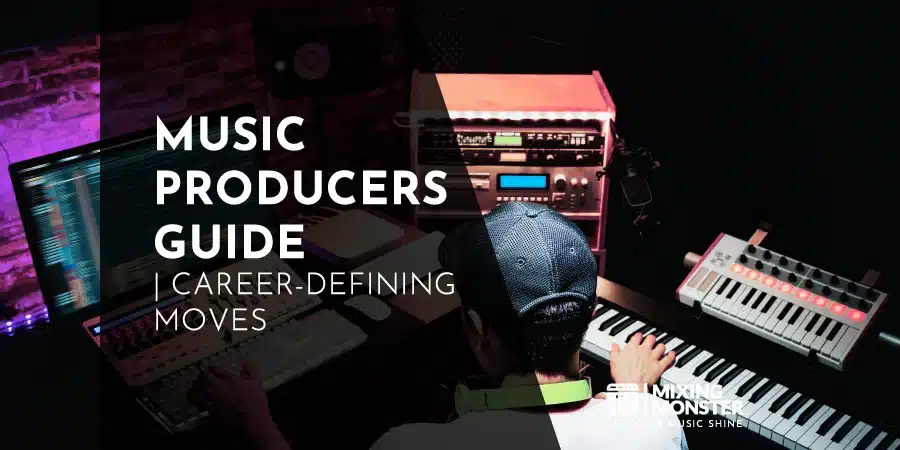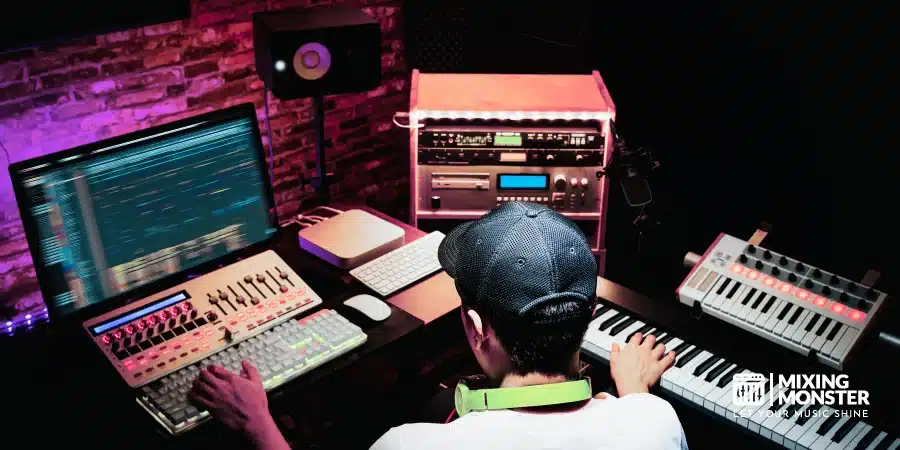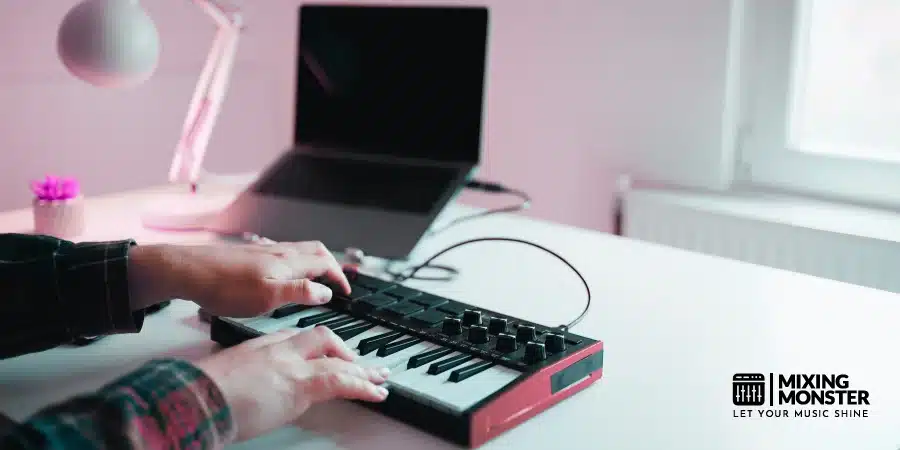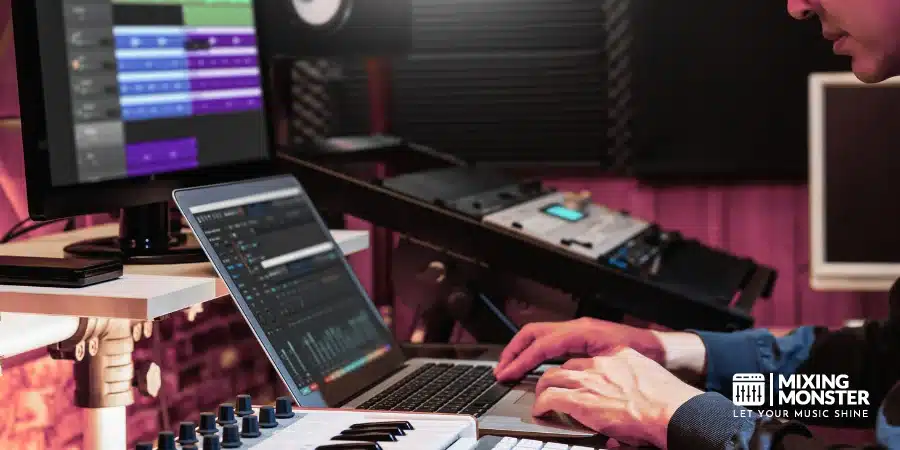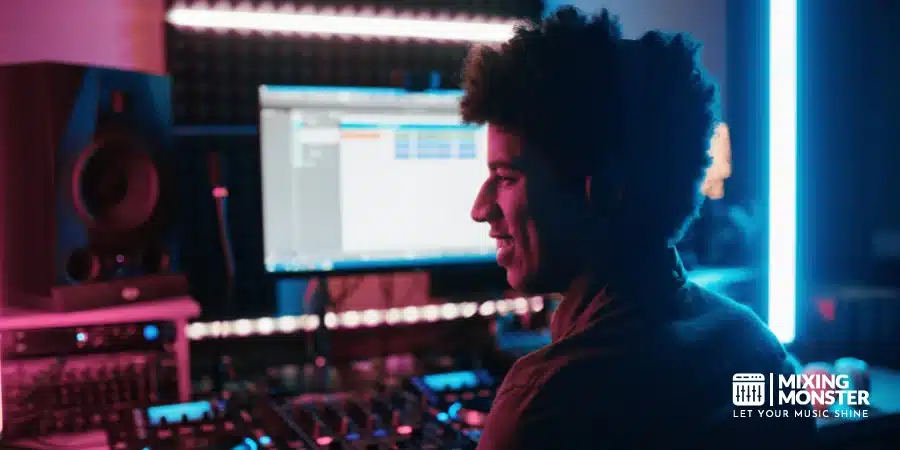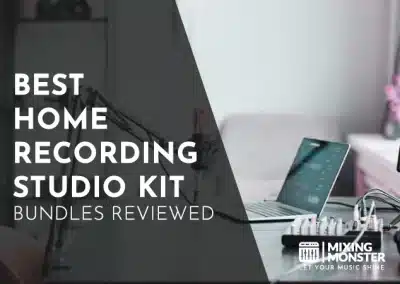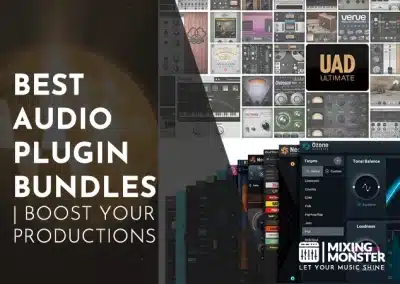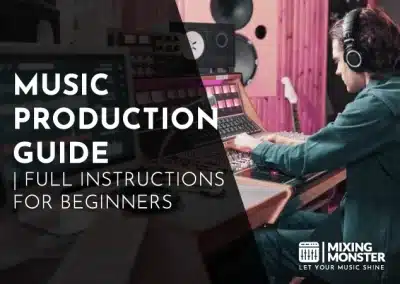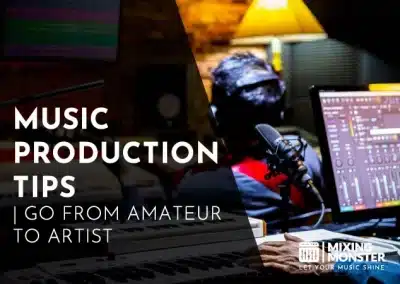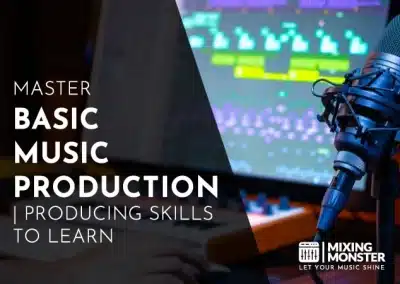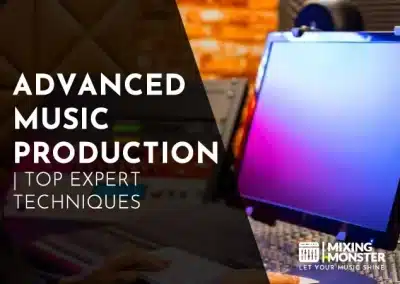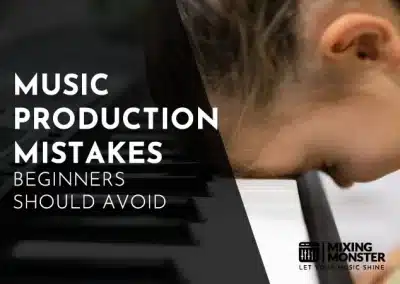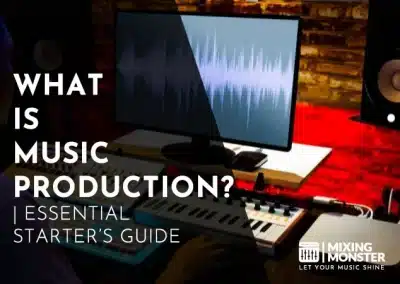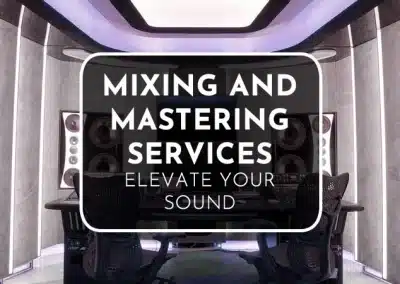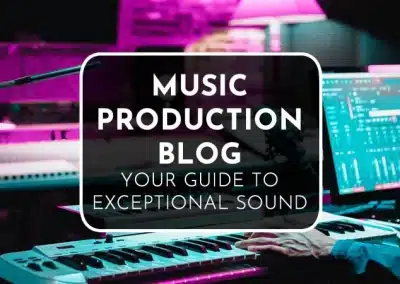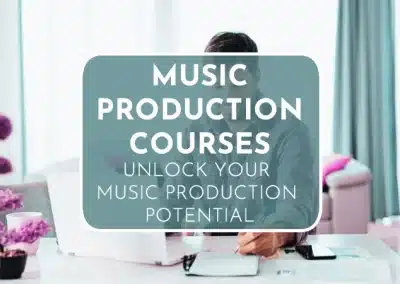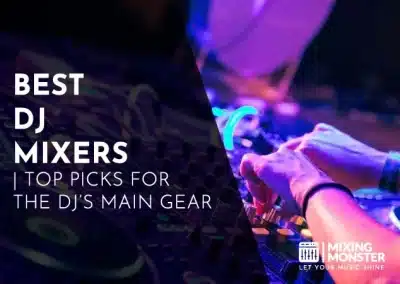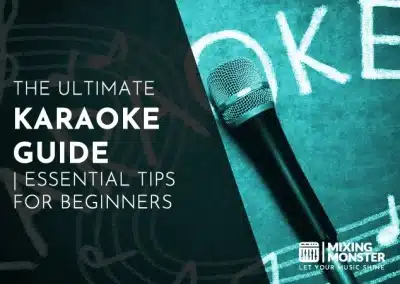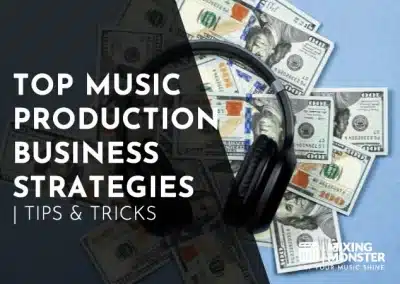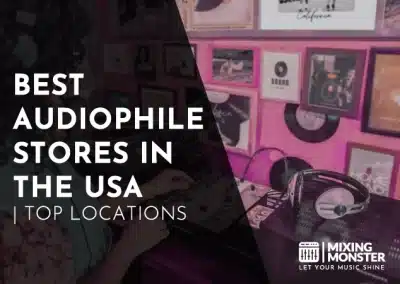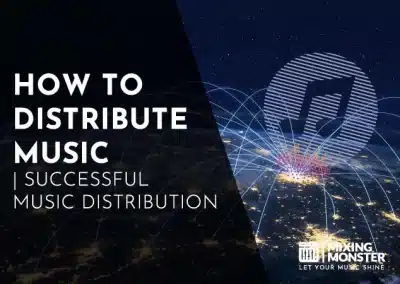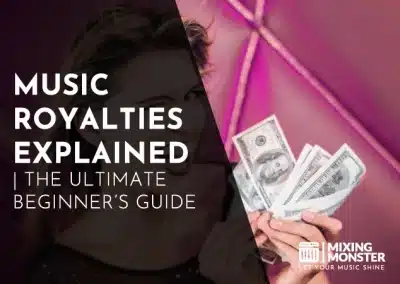Home > Blog > Music > Music Industry
Disclosure: Some of the links below are affiliate links, meaning that at no additional cost to you, we will receive a commission if you click through and make a purchase. Read our full affiliate disclosure here.
Behind every hit song, you’ll find a visionary architect shaping raw talent into something unforgettable. These days, music producers aren’t just technicians behind the glass—they’re creative forces driving an artist’s sound and career.
Music producers juggle everything from songwriting and arranging to recording engineering and artist development. They are the engine room of the modern music creation process.
The record producer role has changed a ton over time, morphing from technical oversight into creative partnership. Producers act as project supervisors, shaping the artistic direction while handling the technical nuts and bolts.
They select songs, coach performers, arrange compositions, oversee sessions, and ensure the final product meets industry standards. Some of today’s top music producers have such a strong style that it defines entire genres—or even decades—of music.
As the industry continues to evolve, producers must keep pace with new technology while maintaining their own creative spark. The rise of accessible production tools has opened the door for talented newcomers working from their bedrooms.
That shift brings its own set of headaches and opportunities. More producers now build careers through remote collabs, beat licensing, and by developing a signature sound that cuts through the noise.
KEY TAKEAWAYS:
- Modern producers blend technical chops with creative direction, becoming essential partners in an artist’s journey—not just background players.
- The producer’s job keeps expanding: songwriting, arrangement, artist development, the whole package.
- Mastering new tech and developing a distinctive production signature can open up all sorts of revenue streams in this ever-shifting industry.
Table Of Contents
1. Music Producers’ Evolving Role In The Industry
2. Mastering AI-Assisted Production Technologies
3. Building Strategic Music Industry Relationships
4. Developing Multiple Revenue Streams
5. Creating A Distinctive Music Production Signature
6. Key Takeaways For Music Producers
FAQ

1. Music Producers' Evolving Role In The Industry
The music production landscape has changed radically in recent decades. Tech leaps, new business models, and shifting tastes have pushed producers’ responsibilities way past the old-school recording gig.
From Behind The Boards To Brand Builders
Producers have gone from technical operators to brand builders and tastemakers. They’re not just studio hermits anymore—folks like Mark Ronson and Rick Rubin have become celebrities, with huge followings and real name recognition.
That visibility also brings in new revenue. Endorsements, masterclasses, and branded content—modern producers often turn their signature sounds into marketable assets. Timbaland’s rhythmic tricks, Max Martin’s pop formulas—these are basically brands now.
Lots of producers launch their own labels, artist development shops, or production schools. Music producers now discover talent, nurture artists, and build musical communities around their taste and know-how.
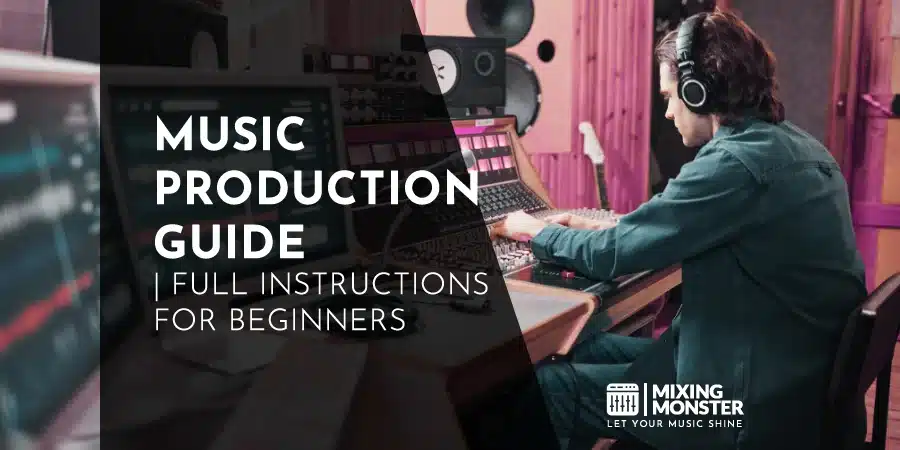
The Modern Producer's Technical Toolkit
The gear pile has exploded far beyond old-school racks and tape machines. Digital Audio Workstations (DAWs), such as Ableton Live, Logic Pro, and FL Studio, are now the backbone of most audio workflows. They make complex arrangements and wild manipulations possible from a laptop.
Virtual instruments, sample libraries, and plugins put sounds at your fingertips that used to require huge budgets and studio time. You can whip up orchestral arrangements or electronic beats in your home studio—no big deal.
Cloud collaboration has changed the game, too. Producers now collaborate with artists worldwide. Home studios have made quality recording accessible for indie artists everywhere.
Technical skills now cover more ground than ever:
- Sound design and synthesis
- Beat programming and sample manipulation.
- Vocal tuning and time correction
- Mastering basics
- Even video editing for social media
Balancing Artistic Vision With Commercial Viability
Producers today must navigate a delicate balance between their own creative vision and what the market demands. They delve into Billboard charts and streaming statistics to inform their choices, yet still strive to stay true to their own ideas.
Genre-blending is almost a requirement now. Producers like Noah “40” Shebib and Jack Antonoff have carved out signature sounds that define artists and continue to connect with massive audiences.
Understanding music theory is helpful, but the key is using it in ways that feel fresh and approachable. The streaming era has producers front-loading hooks and making tracks that fit right into playlists.
Producers often jump into songwriting now, too, earning publishing shares. It’s a nod to how much creative heavy lifting they actually do.
Cross-Genre Versatility As A Career Advantage
If you can work across styles, you’ve got a leg up in today’s messy music market. Look at Finneas or Ludwig Göransson—bouncing between pop, film scores, and hip-hop keeps their careers interesting and sustainable.
Latin music production has become especially valuable, thanks to the global rise of reggaeton and Latin pop. Producers who really get those rhythms have a shot at new audiences.
Modern producers often need to handle:
- Hip-hop beats
- Electronic music
- Acoustic instrument recording
- Pop vocal production
- Experimental sound design
Cross-cultural collabs are more common—and lucrative—than ever. Producers who can bridge different musical traditions end up creating wild, hybrid sounds that travel well globally.
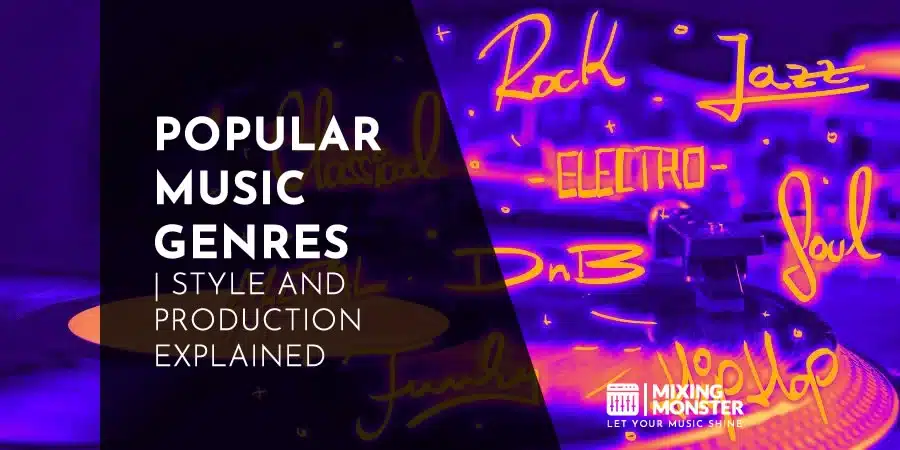
2. Mastering AI-Assisted Production Technologies
AI tools are shaking up music production workflows, letting producers work faster and opening up creative possibilities. Most modern producers are weaving these technologies into their process to boost their own ideas, not just to automate everything.
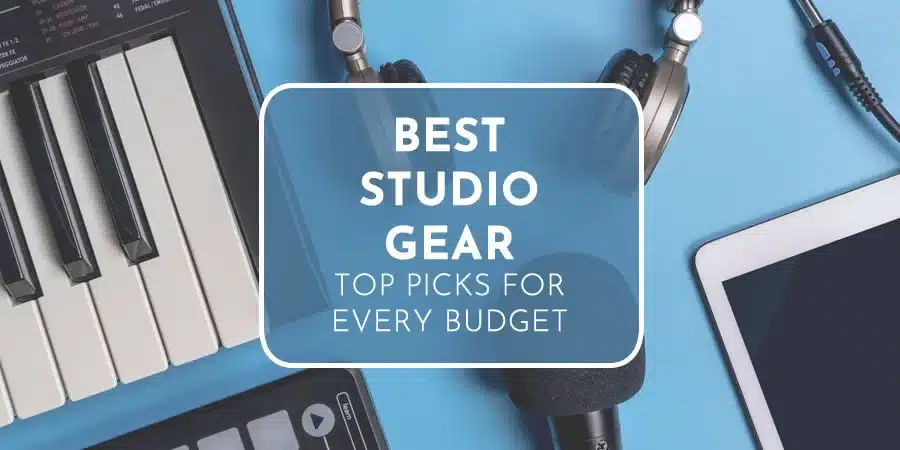
Essential AI Tools Every Producer Should Adopt
There’s a wide array of AI-powered tools available now, and they significantly reduce the drudgery of production. Approximately 60% of musicians are already utilizing AI in some aspect of their workflow.
For mixing and mastering, iZotope’s Neutron and Ozone suites analyze your tracks and suggest EQ, compression, and spatial tweaks. They slot right into DAWs like Logic Pro, Ableton Live, and FL Studio.
Stem separation tools, such as LALAL.AI and AudioShake, enable you to isolate vocals, drums, bass, and more from finished tracks. That’s a game-changer for remixing or sampling.
When you hit a creative wall, composition tools like AIVA and Amper Music can spin up custom backing tracks based on genre, tempo, and mood. Sometimes you need a nudge to get moving again.
Preserving Human Creativity In An Automated Workflow
Even with all this AI power, the human spark still matters most. The best producers use AI to enhance their workflow, not to replace their own taste or instincts.
It’s smart to set boundaries—let AI handle the repetitive stuff (like tedious mixing tasks), but keep your own fingerprints on arrangements and the emotional flow.
Try using AI for the initial pass, then refine and tweak things yourself. That way, you get the efficiency boost but still craft something unique.
Intentional imperfections can make a track pop. After AI polishes things up, consider adjusting the timing or adding textures to introduce a bit of human warmth and grit.
It’s all about building a feedback loop between what the AI spits out and your own gut. Let the tech do the heavy lifting, but don’t let it call the shots creatively.
Neural Mixing And Mastering Techniques
AI mixing and mastering have come a long way. Neural networks now analyze reference tracks and adjust your music accordingly.
LANDR and eMastered use machine learning to boost sound quality and loudness. They’ve studied thousands of pro masters to figure out what works.
If you want more control, iZotope’s Master Assistant inside Ozone gives you AI suggestions but lets you tweak things in your DAW until it feels right.
For mixing, AI plugins like Soothe Two and Gullfoss spot frequency clashes and resonance issues, then suggest EQ fixes. Stuff that used to take hours now gets done in minutes.
Neural mixing shines when you want sonic consistency across an album but still need each song to have its own vibe.
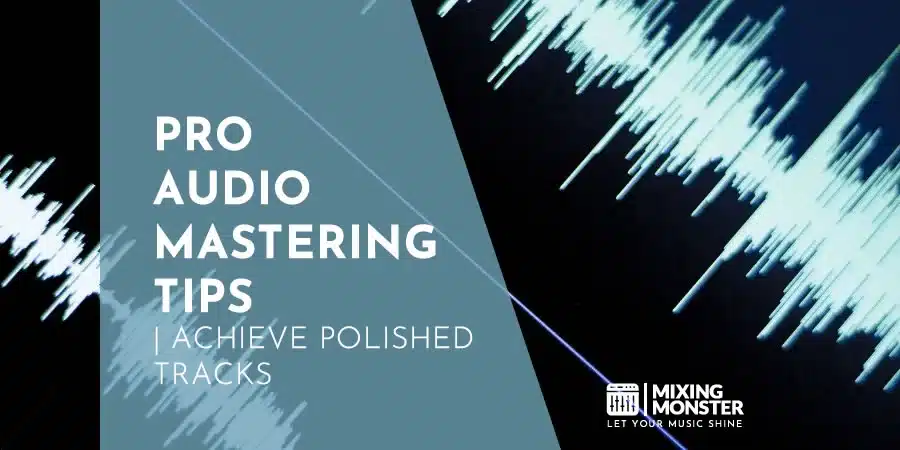
Building Custom AI Workflows For Your Production Style
Customizing your AI workflow can really speed things up. Start by pinpointing the repetitive tasks that eat up your time.
Pro Tools has built-in AI features like Sound Match and Auto-Align for quick, consistent mixing. FL Studio users can lean on MIDI-generating plugins like Scaler 2 to spark new patterns.
Set up DAW templates that drop AI tools in at the right stages—composition, drum programming, neural mixing, whatever fits your process.
AI sample organizers like ATLAS analyze your sound library and group similar samples together, making it way easier to find what you need.
Don’t forget to revisit your workflow as new tech drops. The scene is moving fast, and new tools pop up all the time that might be a better fit for your style.

3. Building Strategic Music Industry Relationships
Building meaningful connections in the music industry is still one of the most valuable things a producer can do. Sometimes, those relationships open doors that your skills alone just can’t.
Networking Beyond Social Media
Online platforms are great for breaking the ice, but genuine industry relationships? Those grow in person. Music conferences, festivals, and industry events offer spaces where conversations happen more naturally.
Bring business cards with your logo, contact info, and links to your work. It sounds old-school, but at events, they still work wonders.
After you meet someone, send a quick, personal follow-up. Reference something you talked about—skip those bland, mass messages.
Try hosting a small meetup or workshop for producers in your area. You’ll look like a community builder, and your network will grow without feeling forced.
Networking goes both ways. If you can, offer real help to others, no strings attached. People remember generosity and professionalism above all else.

Collaborative Projects That Boost Your Profile
Collaboration can level up your production credits way faster than working alone. Look for artists who are just a notch above you and could use your unique sound.
Release collaborative EPs or singles to show off your range. Cross-promotion with other artists pulls in new listeners.
Set up a landing page for collaborators. Show your best tracks, honest testimonials, and make it easy for people to reach out.
Film some behind-the-scenes content during sessions for your YouTube channel. It’ll show off your workflow and help build your brand.
Team up with other producers to make sample packs or preset collections. Not only does this generate passive income, but it also strengthens industry ties through mutual promotion and collaboration.
Working With Music Supervisors And Sync Agents
Music supervisors hold the keys to sync licensing in film, TV, and ads. Find supervisors who already work in your genre for better odds at placements.
Assemble a specialized portfolio specifically for sync. Include full tracks, stems, and edits (15/30/60 seconds) ready for commercial use.
When reaching out, keep it concise and professional. Drop Spotify links to tracks that really show your range and quality.
Go to sync panels and workshops to catch up on trends. The sync world changes rapidly, and you must stay sharp to identify new opportunities.
Joining a sync agency can help, too. They’ll take a cut, but their connections can mean more consistent placements.
Mentorship Opportunities With Established Producers
Mentorship really matters in music. Find mentors whose careers look like the path you want, then pay attention to their work before reaching out.
When you approach a potential mentor, ask specific, thoughtful questions. Vague requests for help don’t suffice.
Offer something in return for their guidance. You can help with a project, lend a new perspective, or take care of some tasks for them.
Check out formal mentorship programs through producer groups or music education sites. These usually have clearer expectations and boundaries.
Virtual mentorship is enormous now. If you prep and stay focused, regular video sessions can be just as practical as meeting in person.

4. Developing Multiple Revenue Streams
Most successful producers don’t stick to just one income source. Diversifying gives you more stability and opens up creative space to try new things in the industry.
Beyond Royalties: Diversifying Your Income Sources
You’ve got plenty of ways to make money beyond royalties. Beat selling platforms let you reach artists worldwide and earn passively. Custom production work, where you tailor tracks for clients, usually pays even better.
Sync licensing is another big one. License your music for film, TV, ads, or games. Many producers say sync licensing brings in the most money out of all their streams.
Sound design is also worth exploring. Making and selling sound packs, sample libraries, or virtual instruments can bring in passive income and show off your technical chops.
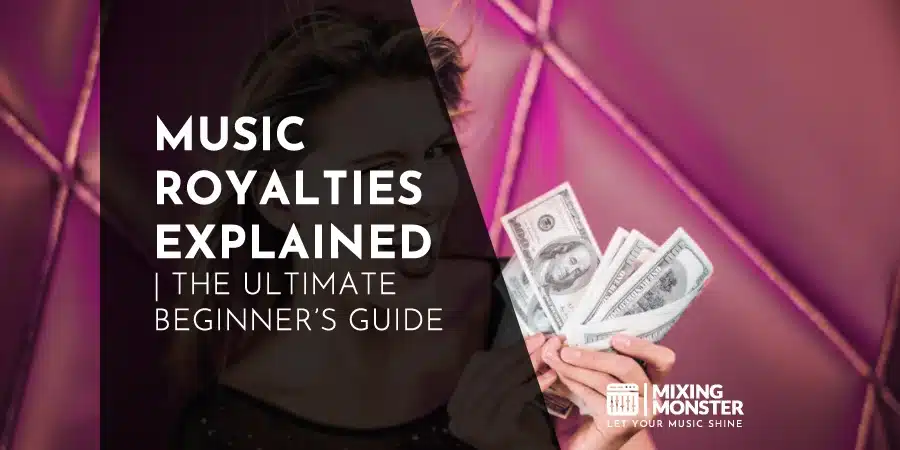
Subscription Models For Producer Services
Subscriptions can give you a steady monthly income. You could run a beat club where subscribers get new instrumentals at different price points.
Membership platforms enable you to provide ongoing value to your supporters.
Some perks you might include:
- Early access to beats
- Exclusive tutorials
- One-on-one feedback
- Discounts on custom work
- Behind-the-scenes stuff
If you have mixing and mastering skills, consider offering monthly packages. Clients pay for a set number of tracks mixed each month, so you get recurring revenue and build long-term relationships.
Educational Content And Knowledge Monetization
Music production tutorials are a legit income source now. You can sell courses on anything from the basics to advanced techniques.
YouTube ads bring in passive cash if you share tutorials or behind-the-scenes content. Grow your channel, and you might even land sponsorships from music tech companies.
Writing e-books or guides is another option if you’re not interested in creating videos.
Some topics worth covering:
- Genre-specific production
- Home studio setup
- Mixing and mastering walkthroughs
- Career tips
Mentoring one-on-one pays well and doesn’t take as much prep as making a whole course.
Virtual Production Sessions And Remote Collaboration
Remote production has exploded lately. You can offer virtual studio sessions and work with artists anywhere, live.
Remote mixing and mastering is easy to set up if you already have a home studio. You can market these services worldwide, significantly expanding your client pool.
If you play instruments, session work is another route. Record custom parts for artists and get paid while building connections.
Beat placement services, where you pitch your tracks directly to artists or labels, can yield significant returns. Some producers specialize in getting their beats to the right people.

5. Creating A Distinctive Music Production Signature
Want people to recognize your work? You’ve got to be intentional about your sound choices, processing, and arrangements—these become your musical signature.
Developing Your Sonic Fingerprint
Producers like Pharrell Williams and Max Martin stand out because listeners instantly know it’s them. You build your sonic fingerprint by sticking to specific techniques:
- Signature processing chains:
Set up template effects or instrument chains you use a lot - Custom sample libraries:
Collect and tweak your own sounds - Recurring rhythms:
Make groove templates that people associate with you
Experimenting is key, but keep it focused. Work on music regularly—even an hour a day helps. That’s how you build muscle memory for your style.
Begin by studying established producers, such as Tainy. Borrow what fits your vision, then twist it into something new.
Strategic Project Selection For Career Growth
Picking the right projects shapes your identity and career. When you’re weighing options, think about:
- Does it fit your sound? Choose stuff that highlights your strengths
- Are there gaps in your portfolio? Fill those in for a more complete body of work
- Will it help you meet the right people? Prioritize collaborations that grow your network.
Most top producers balance commercial gigs with passion projects. That way, they stay paid and creatively satisfied.
It helps to have a decision framework. Consider factors such as artistic value, compensation, networking opportunities, and whether the timing aligns with your other projects.
Your choices should tell a story about who you are as a producer—not just a random collection of tracks.
Building A Cohesive Portfolio That Attracts Clients
Your portfolio should show your range but still feel connected by your unique sound. That’s what attracts clients looking for your style.
What to include:
- 3-5 killer tracks with your signature sound
- Examples that show you’re versatile (but still you)
- Behind-the-scenes looks at your workflow
- Testimonials from collaborators
Share your work everywhere—on streaming sites, social media, and your website. Each platform requires its own approach, in my opinion.
Try organizing your portfolio by genre, mood, or technique instead of just by date. It makes it easier for clients to find what they’re after.
Keep your portfolio fresh. Ditch old stuff and add new tracks that match where you’re headed.
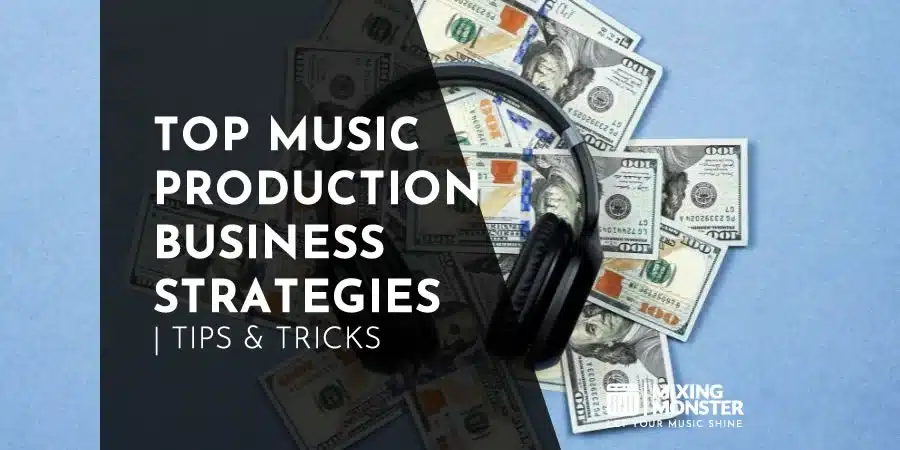
Consistency Vs. Innovation In Your Production Style
Finding the sweet spot between consistency and innovation is tough. Stay the same too long and you’ll get stale, but change too much and people won’t know it’s you anymore.
Max Martin, for example, maintains his core sound while consistently introducing something new. You might try:
- 80/20 rule: Stick to 80% of your signature sound, but experiment with the other 20%
- Slow evolution: Add new techniques gradually, not all at once
- Rotate what you change: Maybe focus on new sounds in one project, arrange the next
Studying established styles gives you a base, but you’ve got to break away sometimes to find your own lane.
Keep track of what works and what flops. Not every experiment will land, but that’s part of the process.

6. Key Takeaways For Music Producers
Successful music producers need to master a range of different skills to thrive in this industry. Technical proficiency and musical knowledge really lay the groundwork, letting producers turn their wildest creative ideas into actual, polished tracks.
If you don’t understand music theory, you’re probably going to hit a wall at some point. Knowing your theory helps you speak the same language as musicians, make more informed arrangement decisions, and build songs that actually sound good together.
But it’s not just about the tech stuff. Producers should push themselves to be more creative, too. Problem-solving on the fly and having a unique artistic voice? That’s what gets you noticed when everyone’s trying to stand out.
Honestly, a producer’s job goes way beyond just hitting record. They must oversee and manage the entire process, from scheduling sessions to keeping artists on track and ensuring deadlines are met without slipping by unnoticed.
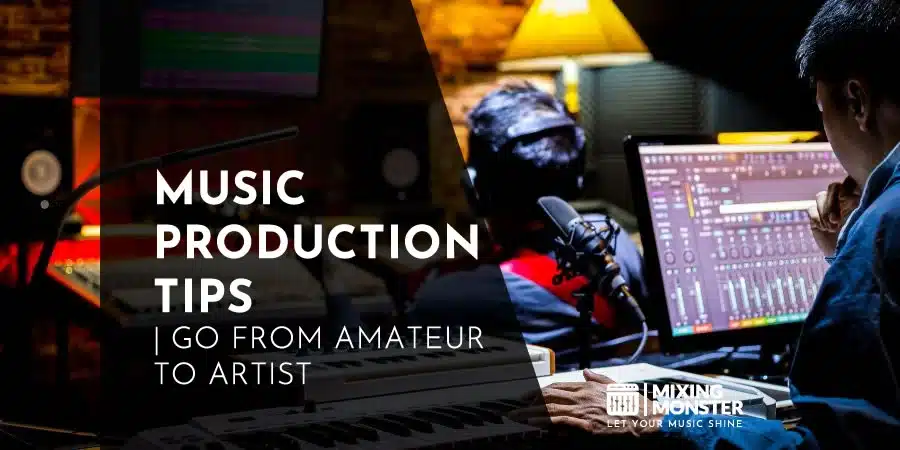
Essential Producer Skills:
- Strong arrangement abilities
- Effective communication
- Technical expertise
- Patience and attention to detail
- Good work ethic and workflow
Staying relevant means you can’t stop learning. Continuous learning is just part of the gig, especially as technology and trends keep shifting.
Building industry connections and keeping up with new production tricks isn’t optional if you want to keep your edge. It can feel overwhelming, but that’s just how things move in music.
Prioritizing goals gives producers a way to focus their energy. Setting clear objectives? It makes it easier to see where you’re going and if you’re actually getting anywhere.
Happy producing!

FAQ
1) What are the defining qualities of a top music producer?
The best producers have great ears and know their way around recording, mixing, and mastering. They also learn how to communicate effectively with artists and guide the creative process without overstepping.
Versatility matters—a top producer can jump between styles, work with different instruments, and still put their own stamp on things. Music production isn’t just about the sound; having good networking skills and some business sense can make all the difference.
They know how to respect an artist’s vision but aren’t afraid to give honest feedback if it makes the track better. And yes, they keep up with new technology and trends, but they don’t let it compromise their artistic values.
2) Who are some influential female music producers in the industry?
Sylvia Massy has left her mark on rock music, working with Tool, System of a Down, and Prince. Her unconventional recording techniques are basically legendary at this point.
Linda Perry moved from being the voice of 4 Non Blondes to producing massive hits for Christina Aguilera, Pink, and Adele. She really leans into raw, emotional production that lets vocal performances shine.
Missy Elliott? She changed the game in hip-hop with futuristic sounds and wild sampling. And WondaGurl (Ebony Oshunrinde) was already producing for Jay-Z, Travis Scott, and Drake before she even turned 20. That’s just impressive.
3) How does the role of a music producer vary across different genres?
In hip-hop, producers usually build the whole instrumental and often steer the overall creative direction. They rely a lot on samples, drum programming, and digital tools—it’s a different vibe.
Rock producers tend to focus on capturing the best live performances, picking the correct mics, and helping bands tighten up their arrangements. There’s less composing, more refining of what the band already brings.
Electronic producers often do it all—from writing the song to mastering the final track. Meanwhile, classical and orchestral producers mostly care about getting an accurate recording and don’t mess with much post-production.
4) What are the typical revenue models for music producers in relation to song royalties?
Some producers get paid a flat fee per track, which can be anywhere from a few hundred bucks to several thousand, depending on their rep and the artist’s budget. The big names sometimes pull in $10,000 or more for a single song.
Royalties are a big deal, too. Producers often negotiate for 3-5% of record sales or streaming revenue. Music producers’ income swings a lot depending on how well a project does and what the contract looks like.
Many deals operate on a “points” system, where the producer receives a percentage of the master recording’s profits. Some might take a smaller upfront fee but ask for a bigger slice of royalties if the song blows up.
5) How can I identify and connect with local music producers for collaboration?
Social media is a goldmine for finding local producers. Try searching Instagram, Twitter, or Facebook with hashtags that include your city and terms like “music producer” or “beat maker.”
Music schools and recording studios usually have their own networks of producers. Showing up at local industry events, open mics, or networking meetups? That’s how you meet people face-to-face and start building genuine connections.
If you’re reaching out to potential producers, ask about their workflow, rates, and whether they handle everything themselves or bring in others for certain parts.
6) What are the notable contributions of American music producers to the music industry?
Quincy Jones revolutionized popular music, particularly with his contributions to Michael Jackson’s “Thriller.” That’s still the best-selling album ever, and honestly, his jazz background added a whole new level of sophistication to pop arrangements.
Rick Rubin started Def Jam Records and pushed hip-hop into the spotlight with a bunch of groundbreaking acts. Later, he jumped genres and helped revive the careers of rock icons like Johnny Cash and Metallica.
Rubin’s style leans toward minimalism—he cares more about raw, authentic performances than overproduction.
Dr. Dre basically built the West Coast hip-hop sound from the ground up. He spotted and launched artists like Eminem, 50 Cent, and Kendrick Lamar—talk about an ear for talent.
Timbaland, meanwhile, crafted these wild, futuristic beats for Missy Elliott, Justin Timberlake, and Aaliyah. He really pushed R&B into new territory.

